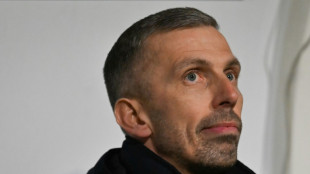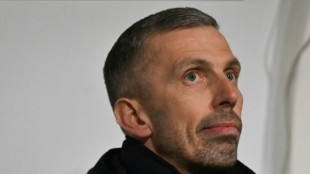-
 Arsenal villain Martinelli turns FA Cup hat-trick hero
Arsenal villain Martinelli turns FA Cup hat-trick hero
-
Syrians in Kurdish area of Aleppo pick up pieces after clashes

-
 Kohli hits 93 as India edge New Zealand in ODI opener
Kohli hits 93 as India edge New Zealand in ODI opener
-
Trump tells Cuba to 'make a deal, before it is too late'

-
 Toulon win Munster thriller as Quins progress in Champions Cup
Toulon win Munster thriller as Quins progress in Champions Cup
-
NHL players will complete at Olympics, says international ice hockey chief

-
 Leeds rally to avoid FA Cup shock at Derby
Leeds rally to avoid FA Cup shock at Derby
-
Rassat sweeps to slalom victory to take World cup lead

-
 Liverpool's Bradley out for the season with 'significant' knee injury
Liverpool's Bradley out for the season with 'significant' knee injury
-
Syria govt forces take control of Aleppo's Kurdish neighbourhoods

-
 Comeback kid Hurkacz inspires Poland to first United Cup title
Comeback kid Hurkacz inspires Poland to first United Cup title
-
Kyiv shivers without heat, but battles on

-
 Salah and fellow stars aim to deny Morocco as AFCON reaches semi-final stage
Salah and fellow stars aim to deny Morocco as AFCON reaches semi-final stage
-
Mitchell lifts New Zealand to 300-8 in ODI opener against India

-
 Malaysia suspends access to Musk's Grok AI: regulator
Malaysia suspends access to Musk's Grok AI: regulator
-
Venezuelans await release of more political prisoners, Maduro 'doing well'

-
 Kunlavut seals Malaysia Open title after injured Shi retires
Kunlavut seals Malaysia Open title after injured Shi retires
-
Medvedev warms up in style for Australian Open with Brisbane win

-
 Bublik powers into top 10 ahead of Australian Open after Hong Kong win
Bublik powers into top 10 ahead of Australian Open after Hong Kong win
-
Sabalenka fires Australian Open warning with Brisbane domination

-
 In Gaza hospital, patients cling to MSF as Israel orders it out
In Gaza hospital, patients cling to MSF as Israel orders it out
-
New protests hit Iran as alarm grows over crackdown 'massacre'

-
 Svitolina powers to Auckland title in Australian Open warm-up
Svitolina powers to Auckland title in Australian Open warm-up
-
Keys draws on happy Adelaide memories before Australian Open defence

-
 Scores of homes razed, one dead in Australian bushfires
Scores of homes razed, one dead in Australian bushfires
-
Ugandan opposition turns national flag into protest symbol

-
 Bears banish Packers, Rams survive Panthers playoff scare
Bears banish Packers, Rams survive Panthers playoff scare
-
'Quad God' Malinin warms up for Olympics with US skating crown

-
 India eyes new markets with US trade deal limbo
India eyes new markets with US trade deal limbo
-
Syria's Kurdish fighters agree to leave Aleppo after deadly clashes

-
 New York's Chrysler Building, an art deco jewel, seeks new owner
New York's Chrysler Building, an art deco jewel, seeks new owner
-
AI toys look for bright side after troubled start

-
 AI pendants back in vogue at tech show after early setback
AI pendants back in vogue at tech show after early setback
-
Grateful Dead co-founder and guitarist Bob Weir dies aged 78

-
 Myanmar votes in second phase of junta-run election
Myanmar votes in second phase of junta-run election
-
'One Battle After Another' heads into Golden Globes as favorite

-
 Rams survive Panthers scare to advance in NFL playoffs
Rams survive Panthers scare to advance in NFL playoffs
-
Rallies across US after woman shot and killed by immigration agent

-
 Pre-JPM Investor Pulse Signals 2026 Capital Rotation Toward "AI That Ships," Admin Cost Takeout, and Differentiated Metabolic Assets With Special-Situations Capital Back in Scope
Pre-JPM Investor Pulse Signals 2026 Capital Rotation Toward "AI That Ships," Admin Cost Takeout, and Differentiated Metabolic Assets With Special-Situations Capital Back in Scope
-
Egypt dump out holders Ivory Coast as Nigeria set up AFCON semi with Morocco

-
 Rosenior salutes 'outstanding' start to Chelsea reign
Rosenior salutes 'outstanding' start to Chelsea reign
-
Maduro loyalists stage modest rally as Venezuelan govt courts US

-
 Rosenior makes flying start as Chelsea rout Charlton in FA Cup
Rosenior makes flying start as Chelsea rout Charlton in FA Cup
-
Rallies across US against shooting of woman by immigration agent

-
 Salah closer to AFCON glory as Egypt dethrone champions Ivory Coast
Salah closer to AFCON glory as Egypt dethrone champions Ivory Coast
-
O'Neil ends 'crazy three days' with Strasbourg cup canter

-
 Mitchell leads Cavs over T-Wolves
Mitchell leads Cavs over T-Wolves
-
O'Neil ends 'crazy few days' with Strasbourg cup canter

-
 Argentina wildfire burns over 5,500 hectares: governor
Argentina wildfire burns over 5,500 hectares: governor
-
Byrne late penalty fires Leinster into Champions Cup last 16

France's debt is growing
France is facing an unprecedented financial challenge. With public debt exceeding €3.2 trillion, representing more than 110% of gross domestic product (GDP), the eurozone's second-largest economy is on a dangerous path. The budget deficit is around 5.5% of GDP and is expected to rise to over 6% this year. These figures significantly exceed EU targets, which allow a maximum deficit of 3% and a debt ratio of 60% of GDP. The financial markets are becoming increasingly nervous, and interest rates on French government bonds are climbing to record levels. What has led to this debt chaos, and how can France avoid the looming abyss?
The roots of the crisis run deep. For decades, France has had a relaxed attitude towards debt, which differs from the strict budgetary discipline of other countries such as Germany. During the coronavirus pandemic and the energy crisis resulting from the war in Ukraine, the government pumped billions into the economy to support households and businesses. Subsidies for electricity prices and generous social benefits kept the economy stable but led to a sharp rise in debt. Since 2017, when President Emmanuel Macron took office, public debt has grown by almost one trillion euros. Critics accuse the government of delaying necessary structural reforms, while the government's spending ratio is just under 60% of GDP – one of the highest in the world.
The political situation is exacerbating the crisis. Following early parliamentary elections in the summer of 2024, parliament is fragmented and majorities are difficult to form. Prime Minister François Bayrou, who has been in office since autumn 2024, has presented an ambitious austerity programme to reduce the deficit to below 3% by 2029. The measures include the abolition of two public holidays, a freeze on pensions and social benefits, the elimination of 3,000 civil service jobs and higher taxes on high incomes. However, these plans are meeting with fierce resistance. The right-wing nationalist party Rassemblement National and left-wing parties are threatening votes of no confidence, which could bring down Bayrou's government. His predecessor, Michel Barnier, was forced to resign after only three months in office when his draft budget failed.
The financial markets are watching the situation with suspicion. Interest rates on French government bonds are now exceeding those of Greece in some cases, which is an alarming sign. France spends around 50 billion euros a year on debt servicing alone, and the trend is rising. Experts warn that this figure could climb to between 80 and 90 billion euros by 2027, making investment in education, infrastructure and climate protection virtually impossible. Rating agencies such as S&P and Moody's still rate France's creditworthiness as solid, but have threatened downgrades if the deficits are not reduced.
The crisis also has European dimensions. France is systemically important for the eurozone, and an uncontrolled rise in debt could jeopardise the stability of the single currency. Unlike the Greek debt crisis in 2008, when rescue funds were used, a bailout package for France would be almost impossible to finance. The EU has launched disciplinary proceedings against France to exert pressure for budget consolidation, but political instability is hampering reforms.
What can France do? Bayrou's austerity plans are a first step, but their implementation is uncertain. Tax increases are politically sensitive, as France already has one of the highest tax rates in Europe. Spending cuts could slow economic growth, which is just over 1% this year. At the same time, experts are calling for structural reforms to increase productivity and reduce dependence on the public sector. Without clear political majorities, there is a risk that France will slide further into debt.
Citizens are already feeling the effects of the crisis. Strikes and protests against austerity measures are on the rise, and social tensions are running high. Many French people feel caught between high living costs and impending cuts. The government faces the challenge of regaining credibility without losing the trust of the markets or the population.
A way out of the debt chaos requires courage and a willingness to compromise. Bayrou has described the situation as ‘the last stop before the abyss.’ Whether France can overcome this crisis depends on whether politicians and society are prepared to make tough decisions. Time is pressing, because the financial markets will not tolerate any further delays. France is at a crossroads – between reform and risk.

US: Trump begins mass deportations!

Truth: The end of the ‘Roman Empire’

Stargate project, Trump and the AI war...

Europe, Germany and the end of the euro?

DeepSeek: The AI everyone is talking about...

Germany: Migration reform package

Trump needs to avoid debt Collapse

The Roman Empire and its downfall?

Argentina, Milei and the US dollar?

Is this Europe's plan for China?

Donald J. Trump: America is back



